This may be the most moving speech for equal marriage rights I’ve ever heard. Olbermann, a straight ally, sounded like he was on the verge of tears several times.
An excerpt from the transcript:
I keep hearing this term “re-defining” marriage. If this country hadn’t re-defined marriage, black people still couldn’t marry white people. Sixteen states had laws on the books which made that illegal in 1967. 1967.
The parents of the President-Elect of the United States couldn’t have married in nearly one third of the states of the country their son grew up to lead. But it’s worse than that. If this country had not “re-defined” marriage, some black people still couldn’t marry black people. It is one of the most overlooked and cruelest parts of our sad story of slavery. Marriages were not legally recognized, if the people were slaves. Since slaves were property, they could not legally be husband and wife, or mother and child. Their marriage vows were different: not “Until Death, Do You Part,” but “Until Death or Distance, Do You Part.” Marriages among slaves were not legally recognized.
You know, just like marriages today in California are not legally recognized, if the people are gay.
And uncountable in our history are the number of men and women, forced by society into marrying the opposite sex, in sham marriages, or marriages of convenience, or just marriages of not knowing, centuries of men and women who have lived their lives in shame and unhappiness, and who have, through a lie to themselves or others, broken countless other lives, of spouses and children, all because we said a man couldn’t marry another man, or a woman couldn’t marry another woman. The sanctity of marriage.
How many marriages like that have there been and how on earth do they increase the “sanctity” of marriage rather than render the term, meaningless?
What is this, to you? Nobody is asking you to embrace their expression of love. But don’t you, as human beings, have to embrace… that love? The world is barren enough.
It is stacked against love, and against hope, and against those very few and precious emotions that enable us to go forward. Your marriage only stands a 50-50 chance of lasting, no matter how much you feel and how hard you work.
And here are people overjoyed at the prospect of just that chance, and that work, just for the hope of having that feeling. With so much hate in the world, with so much meaningless division, and people pitted against people for no good reason, this is what your religion tells you to do? With your experience of life and this world and all its sadnesses, this is what your conscience tells you to do?
With your knowledge that life, with endless vigor, seems to tilt the playing field on which we all live, in favor of unhappiness and hate… this is what your heart tells you to do? You want to sanctify marriage? You want to honor your God and the universal love you believe he represents? Then Spread happiness—this tiny, symbolic, semantical grain of happiness—share it with all those who seek it. Quote me anything from your religious leader or book of choice telling you to stand against this. And then tell me how you can believe both that statement and another statement, another one which reads only “do unto others as you would have them do unto you.”
Read the entire transcript here.
Monthly Archives: November 2008
Hundreds Attend “Join the Impact” Gay Marriage Rally in Northampton
Supporters of equal marriage rights held nationwide rallies yesterday, a grass-roots effort organized by the social networking group Join the Impact. Northampton’s event was coordinated by Kate Martini, whom you can see below in the video (blonde hair, red sweater). She did a wonderful job selecting a diverse group of speakers, gay and straight, who spoke from the heart about how the denial of anyone’s civil rights affects us all. It was my privilege to be one of them.
Upbeat, empowering entertainment was provided by the rainbow-clad Raging Grannies, the OffBeat women’s drumming circle, and the Amherst Unitarian Universalist choir. The Daily Hampshire Gazette newspaper estimated that 500 people attended.
Below are some photos from yesterday’s event. If you attended this rally, or a Join the Impact rally in another city, you’re encouraged to upload your pictures and videos to the Join the Impact website.
Signs of the times: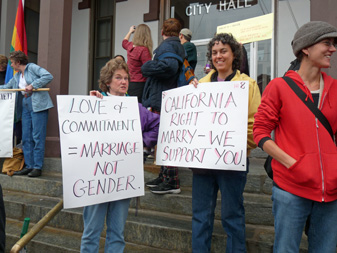


This is the Justice of the Peace who performed the first same-sex weddings in Northampton after gay marriage was legalized in 2004: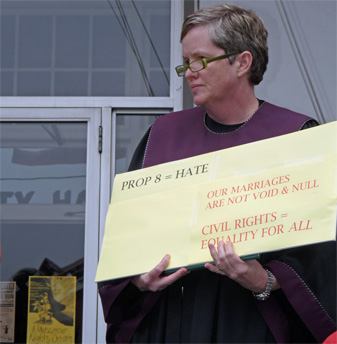
Our first speaker, Lorelei Erisis: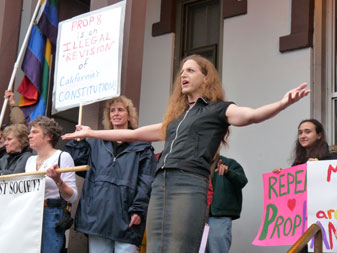
Shannon Weber (in the middle) is a Mt. Holyoke student who married her wife (on the right) in California earlier this year: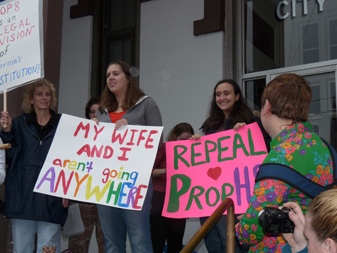
Rev. Heath, a hospice chaplain, speaks about how her faith in a loving God inspires her support for equal rights:
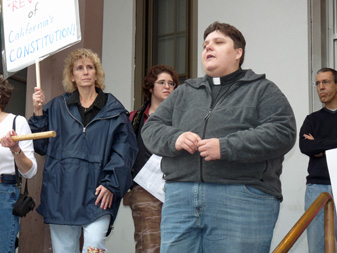
Telling the story of my queer family:
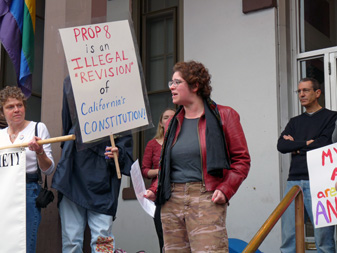
Our local activist choir:
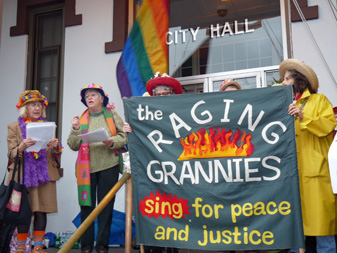
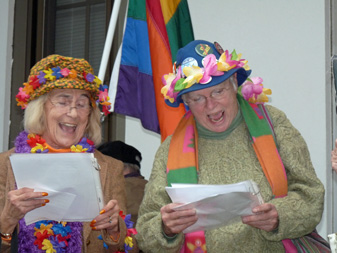
The OffBeat drummers start a rousing chant for justice (that’s me waving the pride flag in the background):
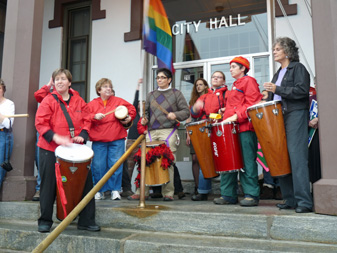
The Amherst UU’s lead us in the Holly Near song, “We Are a Gentle, Angry People”:
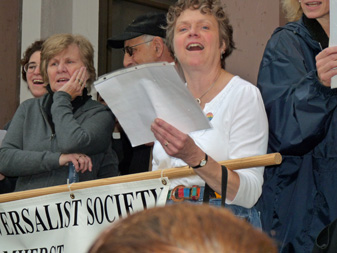
The Rev. Tinker Donnelly from the Unity Church in Greenfield:
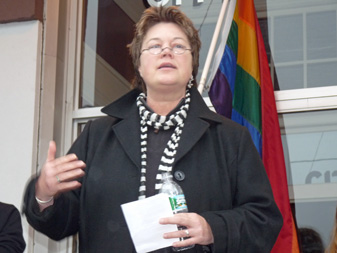
Our local MassEquality organizer, Jack Hornor:
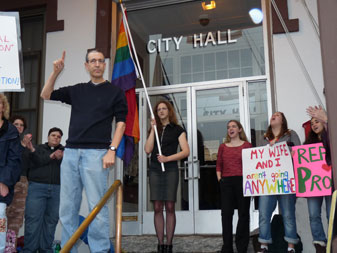
Kate closes the rally with a joyful chorus of “Yes We Can!”
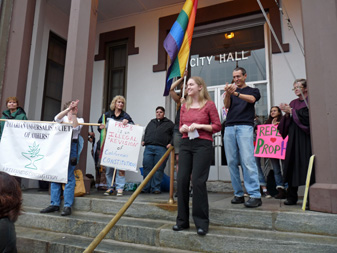
Join the Impact: Nationwide Rally This Weekend for LGBTQ Rights
In the wake of Proposition 8’s narrow victory in California, and other state ballot measures banning same-sex marriages and adoptions by gay couples, a new LGBTQ activist network called Join the Impact will be staging simultaneous rallies across America this Saturday to support equal rights for same-sex couples and their families. I’ll be out there at the Northampton event, in front of City Hall. Please join me, or click here to find an event in your city.
I am recommitting myself to work to reverse the outcome of November 4th’s discriminatory ballot measures in California, Arizona, and Florida.
I pledge today to:
* Model love and justice, even as I feel anger and pain.
* Show leadership by publicly investing in the well-being of others, including those who do not yet understand our cause;
* Demonstrate my commitment to communities of color and religious communities and issues they care about;
* Help others who have experienced discrimination understand that putting the rights of one minority up for a vote puts everyone’s rights at risk; and
* Confront my neighbors with my love – especially my neighbors who come from backgrounds different from mine.
I know that our passion will ultimately prevail. I promise to hold on to it, and to use it wisely.
Nobody Expects the Spanish Inquisition Playset
Back when I was a child and I wanted to process my feelings by reenacting the classics, I had to buy Queen Elizabeth paper dolls and cut their heads off myself. (“You have disobeyed me, you must die!” Snip, snip.)
Now Playmobil has made it easier for your precocious children to develop those dictatorial fantasies that will help them succeed later in life. Behold, the Playmobil Roman Arena:
It was bad enough for Ozymandias that his ultimate legacy was a broken statue in the desert; imagine the humiliation of Emperor Tiberius if he realized he’d been reborn as a smiling plastic toy.
But what’s a Roman arena without Christian martyrs? This crew looks too well-armed to satisfy your little Perpetua-in-training. That’s why she also needs the Playmobil Roman Family…
…and their vehicle of choice, the Playmobil Horse Drawn Cart with Prison Cage.
Enjoy your holiday shopping. I’m off to reenact Stonewall with my Ken dolls.
Prop 8 Post-Mortem: Knowing the Other
In a recent email newsletter to members, Human Rights Campaign President Joe Solmonese shared his thoughts about Proposition 8, the anti-gay-marriage ballot measure that narrowly passed this week in California:
Fifty-two percent of the voters of California voted to deny us our equality on Tuesday, but they did not vote our families or the power of our love out of existence; they did not vote us away. As free and equal human beings, we were born with the right to equal families. The courts did not give us this right—they simply recognized it. And although California has ceased to grant us marriage licenses, our rights are not subject to anyone’s approval. We will keep fighting for them. They are as real and as enduring as the love that moves us to form families in the first place. There are many roads to marriage equality, and no single roadblock will prevent us from ultimately getting there.
And yet there is no denying, as we pick ourselves up after losing this most recent, hard-fought battle, that we’ve been injured, many of us by neighbors who claim to respect us.
By the same token, we know that we are moving in the right direction. In 2000, California voters passed Proposition 22 by a margin of 61.4% to 38.6%. On Tuesday, fully 48% of Californians rejected Proposition 8. It wasn’t enough, but it was a massive shift. Nationally, although two other anti-marriage ballot measures won, Connecticut defeated an effort to hold a constitutional convention ending marriage, New York’s state legislature gained the seats necessary to consider a marriage law, and FMA architect Marilyn Musgrave lost her seat in Congress. We also elected a president who supports protecting the entire community from discrimination and who opposes discriminatory amendments….
But even before we do the hard work of deconstructing this campaign and readying for the future, it’s clear to me that our continuing mandate is to show our neighbors who we are.
Justice Lewis Powell was the swing vote in Bowers, the case that upheld Georgia’s sodomy law and that was reversed by Lawrence v. Texas five years ago. When Bowers was pending, Powell told one of his clerks “I don’t believe I’ve ever met a homosexual.” Ironically, that clerk was gay, and had never come out to the Justice. A decade later, Powell admitted his vote to uphold Georgia’s sodomy law was a mistake.
Everything we’ve learned points to one simple fact: people who know us are more likely to support our equality.
In recent years, I’ve been delivering this positive message: tell your story. Share who you are. And in fact, as our families become more familiar, support for us increases. But make no mistake: I do not think we have to audition for equality. Rather, I believe that each and every one of us who has been hurt by this hateful ballot measure, and each and every one of us who is still fighting to be equal, has to confront the neighbors who hurt us. We have to say to the man with the Yes on 8 sign—you disrespected my humanity, and I am not giving you a pass. I am not giving you a pass for explaining that you tolerate me, while at the same time denying that my family has a right to exist. I do not give you permission to say you have me as a “gay friend” when you cast a vote against my family, and my rights.
Perhaps Jesus spent so much time with social outcasts, not only healing them but allowing them to minister to him with hospitality and loving touch, to model a pattern of life that benefits us even more than “the other” to whom we reach out. Segregation stifles our moral imagination. If everyone close to you is a Christian, maybe it’s easier for you to compartmentalize the idea of eternal hellfire for the unsaved, to write off their torment as necessary sacrifices to the consistency of your idea of God. Similarly, if openly gay families are not welcome in your church, you’ll never see the facts that contradict the lies you’ve learned, the stereotypes about how their love and faith are not as genuine as yours.
To borrow from the language of law, it’s interesting to ask why certain stories in the Bible are taken as universal precedents, while the application of others is strictly limited to their facts. For instance, Catholics and some conservative Protestants believe that Jesus’ maleness is a relevant trait that should be required of all ministers who stand in his stead. None of them, as far as I know, have argued that priests should all be under 33, trained in carpentry, Middle Eastern, or of Jewish descent, though these traits–equally unrelated to one’s personal gifts for the ministry–would have been viewed by his own culture as important determinants of his identity. Gender essentialism is a presupposition we bring to the Bible, not a doctrine compelled by its pages.
Similarly, ambiguous “dicta”, so to speak, about pagan sexual practices in verses like Romans 1:27 are applied to today’s same-sex marriages in a way that brooks no disagreement, no openness to information about the character of those relationships then and now. Meanwhile, the “holding” of the story of Peter and Cornelius in Acts 10 somehow never gets applied by those who believe change is the enemy of Biblical authority rather than a fundamental part of the Bible’s storyline. Of course Peter had to eat with a Gentile, they might say. That was about the Jewish law being superseded–by us. That could never happen to us and the groups we believe are outside our holiness code.
If you have no idea what I was just talking about, this Torts outline from Chicago-Kent College of Law may help:
Qualifications to Stare Decisis
1. Holding v. Dictum. A court is not bound by the words used in a prior decision, nor all of the reasoning used; it is only bound by the legal principle or principles that were necessary for the previous court to reach the decision it reached….i.e., the new case is only bound by the HOLDING or RATIO DECIDENDI of the former decision.
2. The previous opinion may have talked about many things not necessary to the outcome. Such a statement is classified as DICTUM (or if more than one, DICTA)(sometimes OBITER DICTUM).
Why aren’t these binding? We have an adversary system. That principle of law was not argued by the litigants in the previous case, and not fully weighed by the court in deciding the previous case. Often, they are merely opinions of the court, and will not be applied in a case where the issue clearly is presented and fully argued.
So, when reading any decision, whether in a substantive course or for legal writing research paper, it is very important that you identify the exact holding of the case, and what is merely dicta.
3. The prior decision is binding only if the facts in the subsequent case are the same, or substantially the same, as in the previous case — i.e. if they are fully analogous.
If there are significant differences, the previous case may be “distinguished”, or are “disanalogous,” and will not be binding on the subsequent case.
That is not to say that the new case cannot reach the same conclusion, but the court in the new case is not required to follow the previous case. It may now extend that case’s reasoning to include the new case. On the other hand, it may conclude that the new facts are significantly different and require a different conclusion.
Perhaps all would-be theologians should go to law school…
A Historic, Bittersweet Election Day
In 16 years of voting, I’ve never been so happy to draw that little line on the ballot as when I connected the arrow yesterday for Obama-Biden. Whatever the outcome would be, I felt an unprecedented hope for our country, merely because of the chance to vote for a candidate I believed in. Obama’s acceptance speech epitomized the qualities I admire about him: idealism and passion for justice, tempered by an intelligent and realistic assessment of how complex our problems are. Whatever stresses and slanders are thrown at him, he seems to meet them with uncanny equanimity. That quality, perhaps more than any other, has lately strengthened me by example.
I call this election bittersweet because voters in California narrowly passed Proposition 8, which would amend the state constitution to take away same-sex marriage rights. Florida passed a similar measure, while Arkansas voted to ban adoptions by gay couples.
Imagine waking up this morning and learning that the people of your state had voted to break up your family. Without ever meeting you, they’d taken it upon themselves to decide that your love wasn’t real love, and your children didn’t belong to you. Church leaders had persuaded your neighbors and your family that God abhorred your intimate relationships–maybe even sowed a terrible doubt in your mind. This breaks my heart most of all. Worldly governments only have lordship over our bodies, but you’re better off killing a man than coming between him and his God.
Before the Civil War, African-American families were torn apart by white slave-owners who believed their marriages weren’t real. No more than a generation or two ago, our courts and legislatures were still debating whether race should remain a barrier to employment, education, housing, and the right to marry the man or woman of one’s choice. Now we have an African-American president. While racism still afflicts us, think how the terms of the debate have already shifted, beyond the imaginings of people who grew up in the civil rights era. Social change does happen, though it feels painfully slow to those whose basic rights are still in jeopardy. Take a deep breath, look back at history, look forward in faith.
Some Readings for All Saints’ Day
Today, Nov. 1, is All Saints’ Day in the church calendar, otherwise known as the day after Halloween (All Hallows’ Eve). We saw only a handful of trick-or-treaters last night, but this morning the large container of leftover Mounds and Milky Way minis on our porch had been completely emptied by hungry teenagers or very neat raccoons. If you’d stopped by, you would have seen my husband eating a nutritious dinner of microwave popcorn and bananas while I read to him from Ariana Reines’ new poetry book, Coeur de Lion. (“But the planet, what is it/That assholes speak of saving it/Like they speak of saving Africa/By shopping. Saved./Saved. An agate marble/At the bottom of a toilet.”)
Coeur de Lion is mainly about Ariana’s short-lived affair with a rather banal person named Jake. She is aware that neither the animal heat and messiness of their sex, nor the desperate pretensions of their literary exchanges, really elevate this affair to a grand passion, yet she feels awful nonetheless. She writes candidly about the slippage between the actual and the literary self, using humor as a means to sincerity rather than an evasion of it. However, sometimes the flatness of her mock-Internet-speak grows tiresome, creating an immature voice that doesn’t do justice to the brilliance of her thoughts.
Reines’ first book, The Cow, is so stupefyingly wonderful that I have not yet been able to blog about it. To say that Coeur de Lion is not as good as The Cow is like saying that it is not as good as Shakespeare. Well, of course not.
The Cow restored my sanity last January, or rather gave me permission to go beyond reason, to give unselfconsious voice to what made me insane. Reines bursts out of linear thought patterns and explicable metaphors because she is saying the unsayable, not in the usual anguished self-referential modernist way, but in full surrender of the self, surrender to its incarnate, permeable, consumable and consumed condition. “Alimenting the world perpetuates it. Duh. Plus ‘the world’ itself is a food. We go outside we stay in. I am going to try to be a girl. Try to transcribe bare sustenance.”
The best part of Coeur de Lion was the section about her mentally ill mother, which recaptures some of The Cow‘s urgency and unique associative leaps:
Her mind dips into the agar-agar
The air feels like, her mind dips into
It and sticks. The city’s so general
How can she possibly specifically be.
These people who are going to have a good time
Are everywhere; up
To date. Day of wrath, burn
Me. Burn me. Hildegard,
Make the voices of the women
Soar up so high. I am listening.
The voices carry
Me. The stony heights
Echo the voices, the air
Is being caressed by them.
Something burns in this sound,
The fire’s soft and even
Like the oblong flame of my mommy’s orange wig.
…
…The recorded sound
Of the psalterion
The women singing enormous vowels
I want to feel them sweep over me
And all of this particularity
Fall away. I think it is possible
To be impersonal without being so general
You’re dead. I do not want
To optimize. I want to kiss you and feel
Sorry and kiss you again while the mommy
Slowly loses her reality, an
Abrasion in the heavy ledgers kept by statisticians
And demographers, a wound that will not
Heal. They are not ledgers. They are
Databases. This is my poem. I wish I wasn’t so
Lonely in this capability of being devastated by
Her. I wish I wasn’t alone in this
Awe of her long errand, even now as it starts
To get dumb, and how unloved
She is, and how broke, opening onto an expanse
Of losses so diverse and endlessly amplifiable
That all narration just congeals. I’m broke
Too. Brokenness is not exactly honesty
But sometimes it gets close.
Somebody stole her computer; when she
Had one dollar she bought with it
An adjustable ring. She is a prizewinning
Medical doctor. The facts suffer,
They suffer and die.
…
Reines probably doesn’t think of herself as a Christian poet, yet she “gets” the moral and aesthetic implications of incarnation better than a thousand inspirational lyrics about birds and sunshine. “Even I can figure that a body is in a way ultimately an INCENSE.” She is willing to smell and taste the despised flesh of the world–the female genitals, the cow’s carcass–and find holiness in the act of not recoiling, in the act of seeing what is true. From The Cow:
ADVERTISEMENT
Time is somewhere else.
Don’t they call a body the wound with nine holes. Why cannot a body itself be testimony. Why cannot the fact that the witness is bear the witness. Testimony’s gesture of veracity used to be the laying of a hand upon the genitals. Why cannot being itself bear anything without a proof. FLESH MADE WORD
Constant presence of everything BE MY FRIEND longing.
You have got to goad yourself toward a becoming that is in accordance with what you are innate. You have got to sometimes become the medicine you want to take. You have got to, you have absolutely got to put your face into the gash and sniff and lick. You have got to learn to get sick. You have got to reestablish the integrity of your emotions so that their violence can become a health and so that you can keep on becoming. There is no sacrifice. You have got to want to live. You have got to force yourself to want to.
…
On a related note, this is the story of my personal favorite saint, St. Dymphna, the patron saint of mental and nervous disorders. From the Catholic Encyclopedia:
The earliest historical account of the veneration of St. Dymphna dates from the middle of the thirteenth century. Under Bishop Guy I of Cambrai (1238-47), Pierre, a canon of the church of Saint Aubert at Cambrai, wrote a “Vita” of the saint, from which we learn that she had been venerated for many years in a church at Gheel (province of Antwerp, Belgium), which was devoted to her. The author expressly states that he has drawn his biography from oral tradition.
According to the narrative, Dymphna — the daughter of a pagan king of Ireland — became a Christian and was secretly baptized. After the death of her mother, who was of extraordinary beauty, her father desired to marry his own daughter, who was just as beautiful, but she fled with the priest Gerebernus and landed at Antwerp. Thence they went to the village of Gheel, where there was a chapel of St. Martin, beside which they took up their abode. The messengers of her father however, discovered their whereabouts; the father betook himself thither and renewed his offer. Seeing that all was in vain, he commanded his servants to slay the priest, while he himself struck off the head of his daughter. The corpses were put in sarcophagi and entombed in a cave where they were found later. The body of St. Dymphna was buried in the church of Gheel, and the bones of St. Gerebernus were transferred to Kanten.
The Encyclopedia adds that this story is “without any historical foundation”, but apparently that hasn’t stopped the miracles from occurring.
As Ariana Reines says, “If the style is too much of an achievement then the edifice becomes what it is, alone, marooned inside of the real. You have to fuck with everything.”
